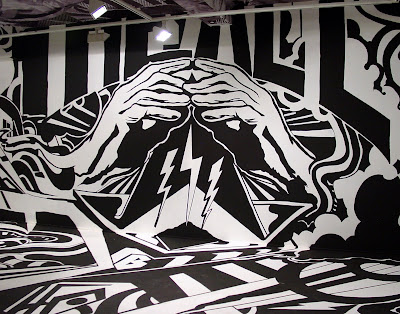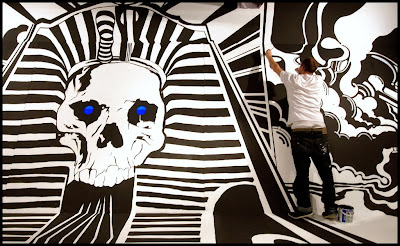The Art Gallery,
University Of The Arts, London
10 Dec 09 – Feb 2010
all photos: NoLionsInEngland and Howaboutno where stated
Two major solo shows, a couple of crew shows not to mention some shutter painting have already made 2009 a prolific year for Cept.
Not to be outdone, Cept’s alter ego Mike Ballard has a major heavyweight solo show to see out the old year and also to see out an old building too. The location is the University Of The Arts, an educational establishment that will be demolished in February and whose imminent demise frames the challenge addressed by Ballard which is to celebrate the existence and conclusion of the gallery’s life cycle.
In 2008, Mike Ballard and Cept had a joint solo show in a ramshackle warren of a warehouse which featured an illusion room created by Cept.
Cept vs Mike Ballard, London 2008
First thought upon entering the large single storey hall of this show is that Mike Ballard has created a very similar illusion room. But there are several critical differences; the scale is much much larger, probably three to four times the floor area; the ceiling is a wild collage of black and white digital images rather than paint and there is none of Cept’s characteristic graff writing and almost none of the lichenstein-esque pop women.
The walls are dominated by about seven key images which relate to the themes of the show. In the corner furthest from the entrance to the room, a large hand points into the wall and an explosion erupts from the finger, starting time, the universe and bringing everything to life.
Existence is dominated by man’s desire to control time whilst living the simultaneous delusion that time is something the rolls out ahead of the now, the artist sees existence as being part of a continuum in which the past, the present and the future are all equally present, always have been and always will be. The illusion and delusion of mastery of time is symbolised by the hands grasping at a tilted pyramid. At the foot of the pyramid the initials MB are the only nod towards the artist’s identity.
Around the room Ballard brings the whole of creation at a broader cosmic scale into the room. Technology clashes with the ancient everywhere, a pyramid death mask with illuminated eyes sits above galaxy rays transmitting across printed circuit board links to the ever repeating circular motif “The end of the beginning, then beginning of the end”, reflecting the parlous state of the building as it sits on the developer’s death row. The eyes are actually peep holes through to a couple of televisions replaying excerpts from Sun-Ra’s rambling shambles of a blaxploitation space oddity movie “Space Is The Place”. Satellite dishes sit on pyramids covered in hieroglyphics created by Ballard but inspired by pre hip-hop New York gang symbology fused with more Sun Ra mystical “I come from Saturn me” runes.
The End Of The Beginning, The Beginning Of The End
A sonic message is relayed through hidden speakers behind the pyramid mask, the indistinct voice sounds urgent and insistent, you can’t escape the noise and you can’t ignore it, it is hard to make out the terse phrases “I know what I have witnessed and now it is your turn, prepare yourself for a journey of self discovery” .
Although there are no graffiti style letterings in the room, the floor contains a wild and wired spray of straight lines, ray paths and links between the principal images on the wall. The pattern breaks up in places into wild style links and connections, just the actual letters themselves aren’t there. Ballard has based this on NY legend Rammelzee’s Ikonoklast Panzerism manifesto with its idea of wild style lettering locked in battle with structured and formal Roman style lettering, leading to a cyclical deconstruction of letters as carriers of language through the form known as graffiti, the rejection of received forms for letters and anarchic destruction of the way society uses written communication. Which doubtless makes sense if you have fried your brain on dope for a few decades.
Weird corrugated patterns break up the floor and trick the eye into believing the flat floor is moulded into sharp shallow peaks and troughs, the patterns also reflect Ballard’s fondness for hip-hop and modern jazz. The trompe l’oeil effect is at its most powerful in the corners and where the eyes finds it hard at times to discern where the horizontal becomes the vertical and where floor meets wall. In this photo of the artist putting in hasty last minute touches, the eye easily persuades the brain that Ballard is hovering half-way up the wall.
In Cept’s Dalston illusion room the pillars in the space formed geysers of emulsion linking the patterns on the floor and the ceiling. In this rendition by Ballard, the stark black and white patterns crash to an abrupt halt against a massive paste up covering every square inch of the ceiling. The collage image fuses the ancient with the modern again, Michelangelo’s David is given an MF Doom mask, Afrika Bambaataa fuses with classical cherubs sitting alongside graffed subway trains and images of spray painters.
The point of the ceiling is really to draw eyes up to the sky and to subscribe to the belief that there is something out there, the whole idea of everything on this planet and within this space is watched and destinies such as the fate of this room are possibly under the control of greater forces than we comprehend.
The task of pasting the enormous paper to the ceiling was made immensely complicated by light fittings, fire safety equipment and a bizarrely random mix of different height beams, so nip and tuck compromises were required to achieve the correct alignment of certain critical elements such as the mirror image subway trains.
Cept’s graff heritage is referenced in one small area and that is an astonishingly deceptive perspective piece which captures a trackside cutting leading to a train tunnel where the young Cept first honed his skills as a spraycan graffiti writer, one of Ballard’s women weeps for Cept, we don’t know why.
There aren’t any paintings hung in the illusion room but in the foyer are just three small edition prints fitting with the themes explored in the show, including a digital print of the original image pasted to the ceiling. The image is too large to absorb in a single sweep in the room and too complicated to be condensed to the small scale of the print.

The All Of Everything ceiling image
Ballard has taken on the schizophrenia of a space which is simultaneously a destination as a gallery yet a transit passageway for people using the space as a throughfare to the many doors, he also conquers the notion of the building in transition between its current manifestation as a gallery and its immediate future as a pile of rubble then subsequent re-birth. We are lucky that someone with Ballard’s skill, imagination and generally intellectual weirdness has been given the use and total abuse of this space at this particular resonant point in its life cycle.
The show makes a huge statement, the all of everything, everything from beginning of time to the end, from floor to ceiling, top to bottom and everything in the whole of time and space, Mike Ballard lays it all out in the context of the life cycle of this building and it only needs two colours. Mike Ballard sets out the all of everything in black and white.
The space is amazingly photogenic, see more here [later today]. For enlightenment and reference, check out Cept vs Mike Ballard here and reviews of Cepts 2009 Galaxy Rays show in Bristol and The Frozen Explosion show at the Writer’s Bench in London




2 replies on “Mike Ballard: The All Of Everything”
You people are a disgrace. Graffiti belongs on the streets, not in a museum!
Thieves and sellouts, the lot of you.
This is art, not graff. If graff can leave the streets and live in HOFS, graff stylisms can be used in a setting like this. This wasn't a museum, this was a hall which was destroyed with Ballards work still on the walls, a fate Ballard anticpated and was celebrating here.